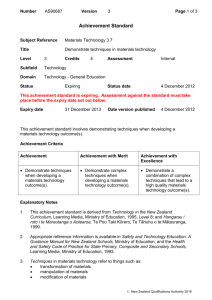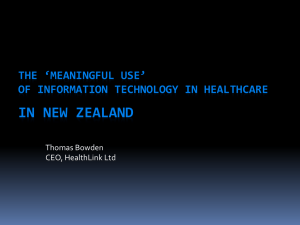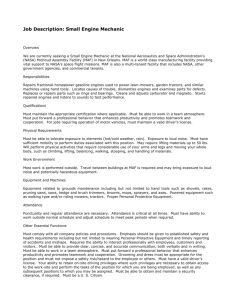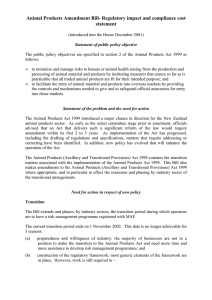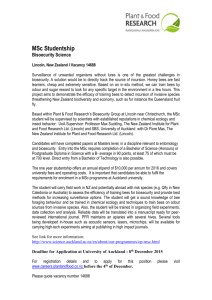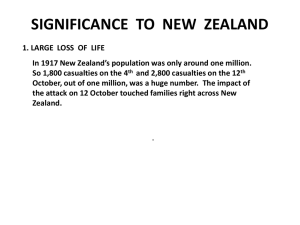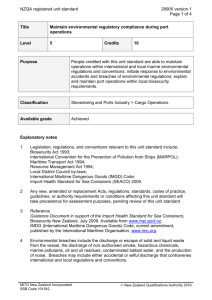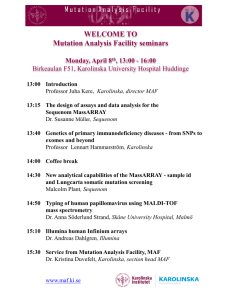Growing and protecting New Zealand
advertisement
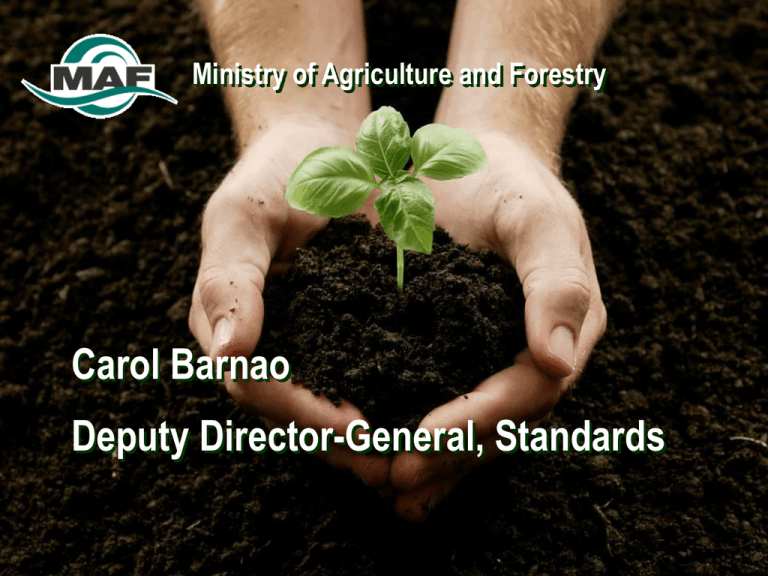
Ministry of Agriculture and Forestry Carol Barnao Deputy Director-General, Standards Today… • The new MAF – our strategy • Standards Branch structure and key responsibilities • The Food Bill – where is it at; what are the issues and what we are doing about it • Our relationship with you – now and the future • Question time Our strategy 2030 Our vision Growing and protecting New Zealand Our focus • Protecting from biological risk • Maximising export opportunities • Improving sector productivity • Increasing sustainable resource use Our approach • Enabling • Partnering The right kind of organisation • Agile, informed and adaptable • Continuously improving our services • Less bureaucratic • Focusing on relationships and results, developing our people, making informed decisions and delivering on our obligations to Māori Our structure Director-General Wayne McNee Office of the Director-General Dan Bolger Standards Carol Barnao Corporate Services Nigel Prince Māori Primary Sector Partnerships Ben Dalton Policy Paul Stocks Resource Management and Programmes Scott Gallacher Compliance and Response Andrew Coleman Verification and Systems Roger Smith Standards branch structure Deputy Director-General Carol Barnao Director, Market Assurance Tim Knox Director, Science and Risk Assessment Steve Hathaway Director, Animal and Animal Products Matthew Stone Director, Systems, Support and ACVM Debbie Morris Director, Plants, Food and Environment Peter Thomson Executive Assistant Adele Gilliver Linking us to the organisational strategy • The Standards branch supports the delivery of the MAF organisational strategy by developing cost effective and fit for purpose regulatory and non regulatory interventions that: – enable market access for New Zealand’s primary products, including food – assure the integrity, safety and reputation of New Zealand’s primary products, including food Linking us to the organisational strategy • Partner with stakeholder to facilitate innovative approaches to grow New Zealand’s exports and meet emerging challenges • Protect New Zealand through biosecurity and food safety risk management Plants Food and Environment Directorate Director Plants Food and Environment Peter Thomson Manager Food and Beverage Glen Neal Manager Food Production and Processing Kay Shapland Manager Biosecurity and Environment Paul Hallett Manager Domestic and Joint Food Standards Cherie Flynn Manager Fresh Produce Shiroma Sathyapala Manager Import and Export Plants Stephen Butcher Manager Plant and Plant Products Bryan Rose Manager Plant Exports Karen Sparrow Key accountabilities • establish regulatory and non regulatory food safety and biosecurity interventions for – the production, processing, handling and sale of food within New Zealand – imports of plants, including plant containment facilities, plant products and inanimate goods – transitional facilities, and border and marine pathways – the export of plants, plant products, organic products, food and beverages • implementation of the Food Bill Key accountabilities • enable implementation of Australia New Zealand Joint Food Standards in New Zealand • establish robust and efficient mechanisms for partnering with stakeholders and manage key relationships with industry stakeholders • contribute to negotiation of import and export requirements with counter-part Competent Authorities and the branch’s other international functions The Food Bill • Result of many years work – Domestic Food Review • What are we trying to achieve? – Safe and suitable food is sold – Increased clarity for business, including greater consistency across the country – Lower compliance costs for business The Food Bill • Government is expecting that – requirements set in law will be at the minimum level necessary to achieve our objectives – fees and charges associated with these requirements will also align with this philosophy – the level of requirements applied to a business will be commensurate with the level of risk associated with what they are doing Food Bill – where is it at? • Awaiting second reading by Parliament – has been waiting to progress since Dec 2010 • Is currently low on the Parliamentary Order Paper HOWEVER • Is No 1 legislative priority for Minister for Food Safety • Is in top 3 legislatives priorities for MAF What are the issues? • Progressing the Bill was not a top priority for Minister in 2011 – other portfolio responsibilities; Christchurch; the election She is now fully engaged • Internet and email campaigns against the Bill – commenced from the USA in late 2011 – a vocal minority and the internet gives them a platform to broadcast their views – Since last December over 500 letters and emails – On-line petition • Significant media (print and radio) comment much of it has been negative and a lot of scaremongering – Has been challenging to get our story on the truth about the Bill picked up, especially through social media… What are the issues? • A lot of misinformation and misunderstanding – Many don’t realise that their current activities (which they consider are legal but unregulated) are actually illegal under current law but Food Bill will allow them • Concerns about – Seeds – Sharing with friends and neighbours – Powers of officers (armed entry without warrants) – A global conspiracy to control the food supply – Barter and swapping – Community and farmers markets Many ‘issues’ in your space • Several of the concerns being raised or questions asked relate directly to areas where TAs have responsibilities: – Farmers and community markets – Frequent and infrequent stall holders or sellers – Charity and fund raising activities – Fees and charges – particularly the difference between registration and verification and that both MAF and TAs will be charging for these activities for different businesses Challenge • The system is not fully developed – we can’t answer all questions at a detailed level • The next step in the process following the Bill passing will be the development of regulations which will be a consultative process • We know this doesn’t help when people are asking for more details on how and when they will be affected What are we doing about it? • Have an engaged Minister • Responding to media articles and letters to the editor • Have developed a standard response letter for Ministers that addresses the issues being raised • Have a Fact Sheet on the Bill – setting out in simple terms what the Bill is about • Have updated and simplified the Questions & Answers on the MAF food safety website • Have ensured that the background documents about the domestic food review are available How you can help • We need to make sure the messages are getting out there • The fact sheet will be available for any of you that wish to use it to help respond to queries you receive – as will key talking points and standard responses for letters • Let us know what is coming to you – we will do our best to help with developing answers Our relationship with you • We can’t do it without you • Local Government and Territorial Authorities are our co-regulators under the Food Bill • Through the Domestic Food Review we have developed our relationship and set up mechanisms that have allowed us to communicate with each other: – TA/LG Steering Group – Cluster Groups – TA Liaison and Advisor staff – Password protected webpage and regular newsletter Our thoughts • Let’s look at what we have and get it ready to transition into the future • Review the terms of reference and modus operandi for the Cluster Groups and TA/LG Steering Group: – What would give you best value? – What are the issues you want to talk about, get help with? • Already looking at the agenda for the next Steering Group meeting on 12 March – Got some of your ideas – Got some of our own What we have identified • So far: – Fees and charges – yours and ours – Training for officers and verifiers – TA exclusivity – National programmes – who is the regulator? – Accreditation – 17020 or not? What are your thoughts? • What do you think? • What are your concerns? • How can we work together to get to the future we both want?

